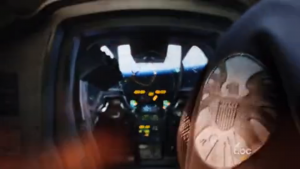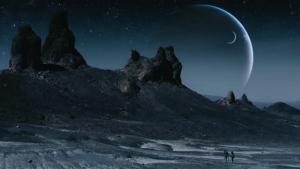Agents of S.H.I.E.L.D. Season 3 Retrospective
- June 1st, 2016
- Posted in Opinion/Analysis . Reviews
- Write comment
 As Agents of S.H.I.E.L.D. draws its third season to a close with the promise of a fourth already secured, it’s coming into its own as a quality production within the Marvel Cinematic Universe. But there are quite a few people who, these days, might question where SHIELD really is within the MCU at all any more. The stakes are always getting higher, and the question becomes harder to deny than ever before: how are these events not catching the attention of the Avengers?
As Agents of S.H.I.E.L.D. draws its third season to a close with the promise of a fourth already secured, it’s coming into its own as a quality production within the Marvel Cinematic Universe. But there are quite a few people who, these days, might question where SHIELD really is within the MCU at all any more. The stakes are always getting higher, and the question becomes harder to deny than ever before: how are these events not catching the attention of the Avengers?
Let’s take a look at how SHIELD season 3 developed and what it means for the MCU as a whole, and the connection between TV and film projects within it.
If there’s anything SHIELD is becoming known for, it’s the teaser for the next season, and season 2’s was a doozy. I don’t think many people expected Simmons’ disappearance into the monolith to kickstart such a massive plot. Some of the speculation from the time is interesting; Simmons as an anti-Inhuman (something akin to what we got in Lash), or a season-long quest of morphing Fitz into some badass to rescue her. a wormhole was not high on the list of guesses, however, and I think we should be grateful for that. The unusual turn led to one of the greatest episodes of the series to date–“4,722 Hours,” which focused exclusively on Simmons and her time on the dead world Maveth. As a deviation from the standard episode construction, without even the typical opening credit sequence, it really provided a breath of fresh air and a n emotional and compelling story.
Throughout the rest of the season, the Inhumans came to dominate the show even more than they had already, and while HYDRA never really went away, they certainly became more a part of the Inhuman storyline than the other way around. With the superpowers outbreak that occurred at the end of season 2, it had laid the groundwork for a huge increase in heroes and villains, something that would be pretty hard for the movies not to acknowledge… especially with the upcoming Captain America: Civil War, which is, of course, all about the conflict between superheroes over whether or not they should be regulated.
Now, one can’t deny that, thematically, SHIELD season 3 certainly echoed Civil War‘s plot–friction between people like Daisy and Coulson, Andrew becoming the Inhuman Lash, whose goal is to wipe out these other superpowered characters… and of course the ATCU trying to regulate Coulson’s Inhuman projects. This even applied to other TV projects like Daredevil, which came to focus in its second season on the conflicted ideologies of the Punisher and Daredevil himself. But SHIELD and its heroes were obviously not part of the Civil War conflict, nor was the fracturing of the Avengers particularly relevant at any point. Heck, it was barely given more than a name check; Talbot mentions the Accords as a reason to start SHIELD on a path to return to its former glory, and Coulson naturally declares his support for Cap, but that’s about it. One could make the argument that a broader picture is hinted at in the film, with references to a growing number of superpowered vigilantes and incidents, but it’s far too vague, and in the context of the film seems to refer more to people like Spider-Man than Inhumans. For people who complained that the Avengers 2 Helicarrier connection was too weak, this certainly didn’t do anything to win them over.
There was also much less crossover from the movies than we had seen in previous seasons; no appearances by Lady Sif or Maria Hill, for example. Sure, we had Strucker’s son, who actually got more screen time in his introductory episode than his father had in the entirety of Avengers 2, and Gideon Malick, a man who had a very brief appearance on the World Security Council during the first Avengers. There was also agent Blake returning in a villainous role, if you count the one-shots… and while none of this is necessarily a bad thing, it does show the growing divide that’s taking place. With lots of rumors about the trouble relationship between Marvel’s film and television divisions, and the recent developments regarding who exactly controls what (culminating in the apparent cancellation of the planned Inhumans movie), one does have to wonder if there’s really any hope in keeping these two connected. What they’ve created with the MCU is an incredible thing, and it’d be a shame to have it ruined over corporate infighting. But all that remains to be seen.
Back to SHIELD itself, one of the growing complaints was the constantly increasing size of the cast. With season 3 adding Mack and Lincoln to the main cast after Hunter and Morse last season, and new characters like, Price, Joey, and Elena showing up, too, the show was getting pretty sizeable, and some characters, particularly May once Andrew was out of the picture, seemed to fall by the wayside. Well, this season definitely took care of that! Hunter and Morse were run off so that they might star in their own series, Marvel’s Most Wanted, which likely won’t make it out of the pilot stage; Lincoln was killed off alongside the Hive-possessed Ward (who was a fantastic villain by the way; Brett Dalton has certainly cleared any lingering doubts about his acting capacity), and Andrew bit the bullet as well protecting Daisy. With the cast cut back down to a more manageable level, hopefully we can get a little more balanced distribution of character focus moving forward.
We also had some attention paid to complaints about the effects; while some last season, like Gordon’s teleportation, were quite good, others… like the Hyde transformation… weren’t. This season gave us some really amazing CGI in the form of Hive and Lash, the latter of whom had a transformation sequence almost rivaling the Hulk’s. If only Hyde had gotten such a chance! That’s without even touching on the amazing sights like the sandstorms of planet Maveth and the edge of space, or the cool new plane that replaced the Bus. Even Coulson gets into the act with his projected SHIELD… shield.
Moving forward, I’m interested to see where the show goes. With the specter of Ward seemingly gone for good, there’s no clear replacement as the big nemesis for our team. Setting up the transhumanist Holden Radcliffe as the next mastermind is an unusual move, but I definitely found his character amusing in the final episodes of this season, so I’m pleased to see him continue on. I’m just not so crazy about transhumanists being portrayed as bad guys… but that’s for another post. All in all, season 3 was amazing all around, even if it sometimes felt like it was losing focus on what it was intended to be. Perhaps what the show has grown into is better than its intent?
What did you think of the most recent season of Agents of S.H.I.E.L.D.? Do you want more and more solid connections to the wider MCU, or would you rather SHIELD keep doing its own thing? You can let me know in the comments, or on Twitter @RetroPhaseShift. If you haven’t caught up on season 3, it’ll be on Netflix in the US in the next few weeks.






I am definitely with you on the transhumanist point.
Overall I thought this was the best season of Shield. To me it might actually be *because* it is now less connected to the MCU (similar to the Netflix shows). I know that means we are losing something — especially with Agent Carter gone — but it might be worth it if we are getting a superior series in exchange.
The second half of the season moved at a crazy pace. I was very entertained and always on the edge of my seat. I thought the same thing as you, that they really ramped up the great special effects or budget. But without ‘Most Wanted’ then they have to find a way to bring back Mockingbird for me.
Somehow they were able to pull off the great Secret Warriors comic AND the recent Inhumans comics that I loved, combined and on television no less. What a world we live in now!